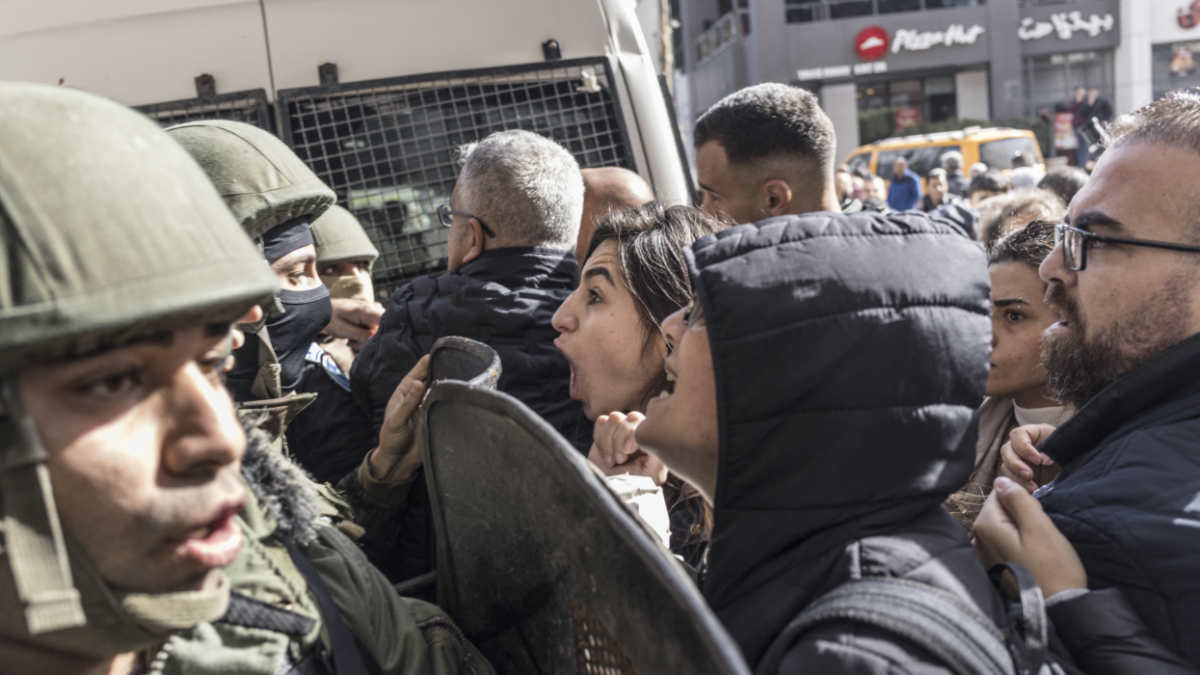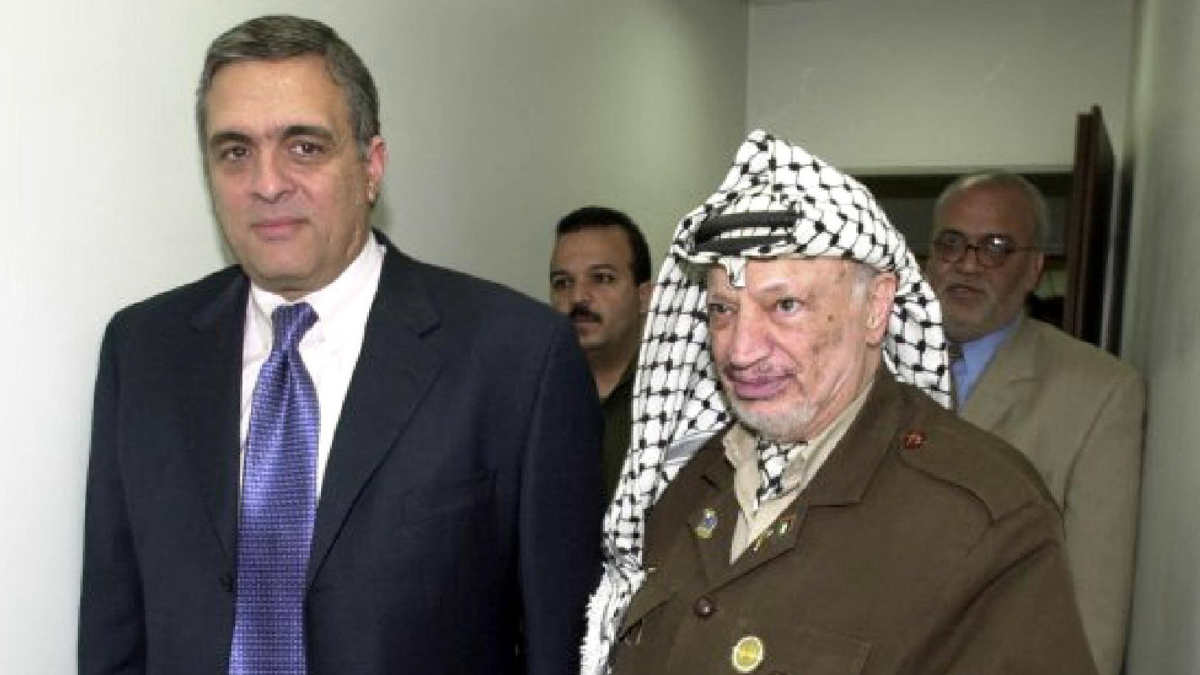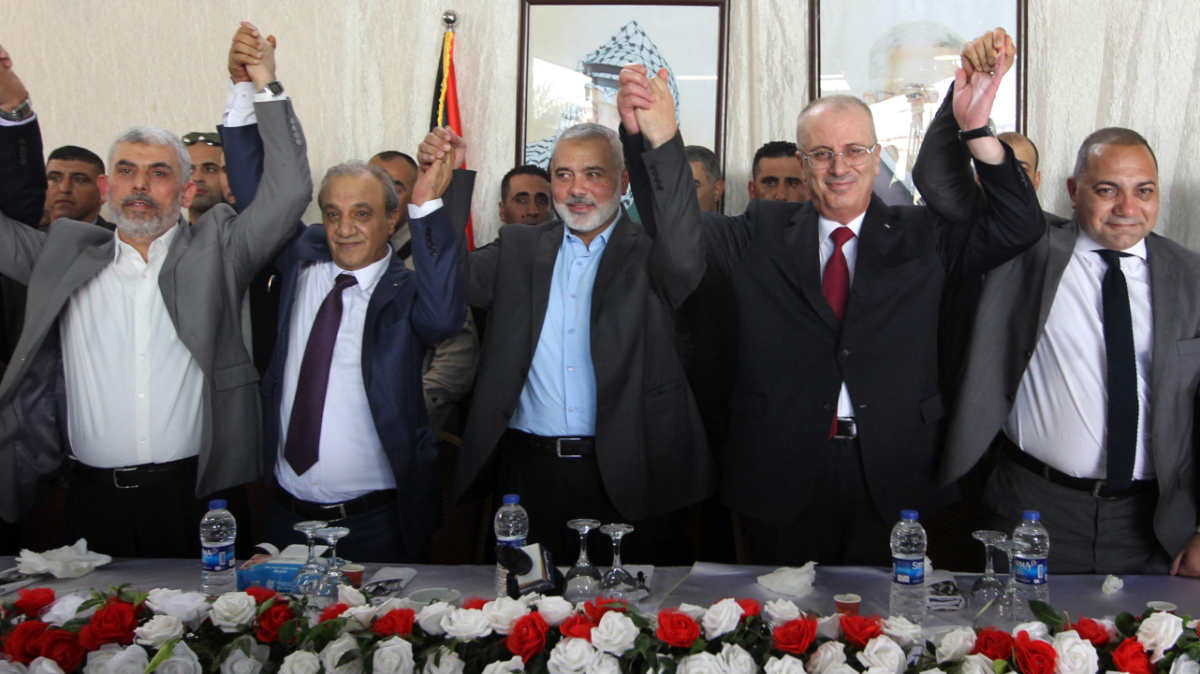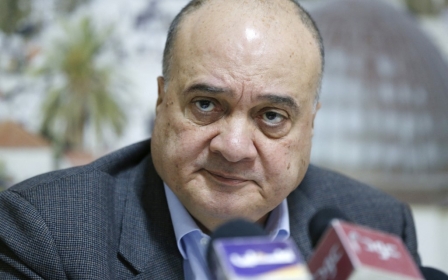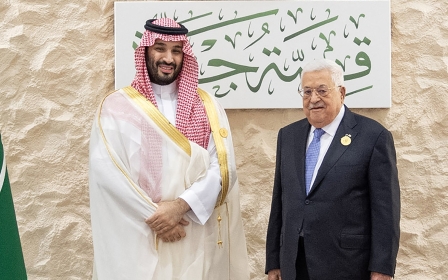The US dips its toes back into Palestinian politics, but has trouble finding its feet
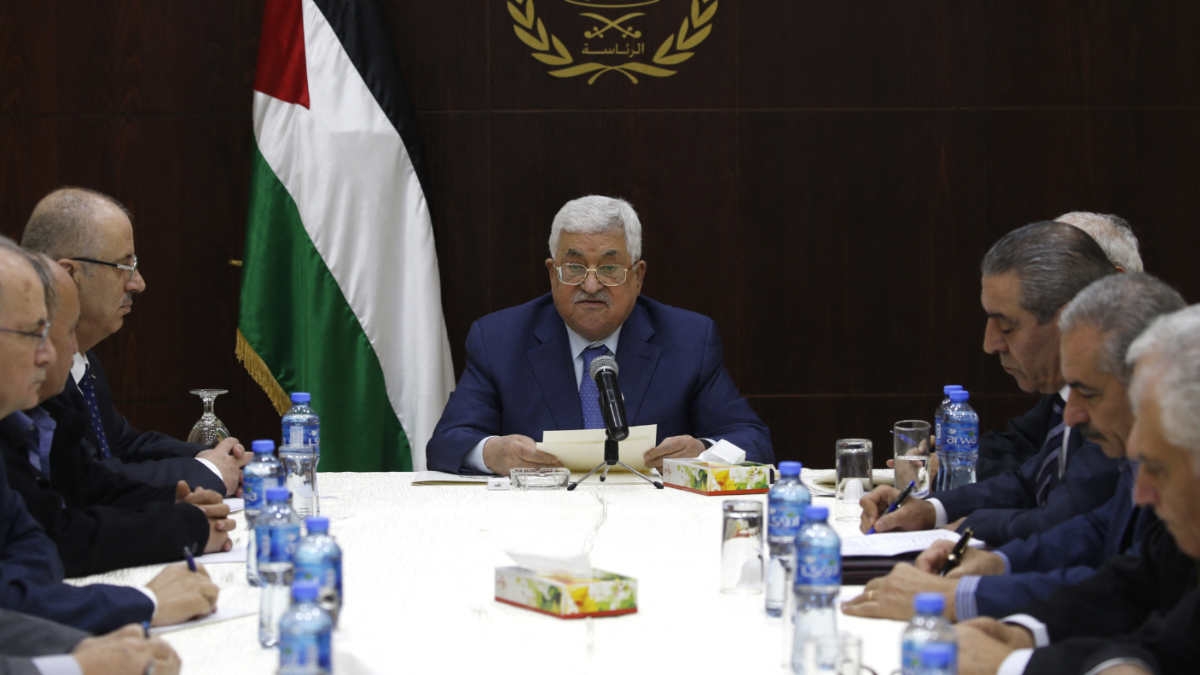
“He thinks he's gonna live forever,” mafia boss Michael Corleone says in Godfather II, summing up his ageing nemesis, Hyman Roth.
It’s a description that perfectly captures Mahmoud Abbas, the leader of the Palestinian Authority, which the Biden administration is staking the future of the Gaza Strip on, a former senior US official told Middle East Eye.
“Mahmoud Abbas doesn’t tolerate succession planning,” the former official, who has met with Abbas said. “He believes in perpetual resurrection.”
The 88-year-old leader’s view has been borne out.
When US President Joe Biden visited Israel and the occupied West Bank in 2022, he spent barely one hour with Abbas. Minus the time spent in translation between the two octogenarians, their conversation lasted 30 minutes, former senior US officials and Palestinian analysts told MEE.
New MEE newsletter: Jerusalem Dispatch
Sign up to get the latest insights and analysis on Israel-Palestine, alongside Turkey Unpacked and other MEE newsletters
“For the US, the Palestinian Authority was basically irrelevant. The authority wasn’t asking for much and the administration had little interest wasting political capital on them,” Diana Buttu, a former Palestinian peace negotiator, told MEE.
That changed after the Hamas-led 7 October attacks on southern Israel and Israel subsequent war on the Gaza Strip.
'The most the PA can do right now is serve as a fig leave for an Israeli occupation of Gaza'
- Former senior US official
The US wants the PA to govern Gaza as part of its “day after” plan for when the war ends. On the sidelines of a think tank event in Turkey earlier this month, Palestinian Foreign Minister Riyad al-Maliki said there was “no doubt” the PA would be the one ruling Gaza.
But the PA is deeply unpopular at home, where it is viewed as a corrupt Israeli collaborator. Underscoring the challenge of winning over Palestinian society, a poll late last year showed 90 percent of Palestinians want Abbas to resign.
Aware of its deep unpopularity, the White House is pushing the PA to enact reforms inside the West Bank in the hope it will boost their credentials and make them more effective in governing Gaza.
'Bankrupt organisation'
The PA was borne out of the Oslo peace talks. Its leadership comes from the Palestinian Liberation Organisation, which waged a decades-long violent struggle against Israel. In return for limited self-government in the occupied West Bank and Gaza, the PLO recognised Israel’s right to exist and renounced armed resistance.
Today, the authority founded by keffiyeh-wearing Yasser Arafat is staffed with creaky grey-haired technocrats and middling spy chiefs who belong to Fatah, Arafat's secular party and main rival to Hamas.
A former senior US official familiar with the Biden administration's thinking said the White House views the PA as a “completely bankrupt organisation”.
“The most the PA can do right now is serve as a fig leaf for an Israeli occupation of Gaza, and potentially be a conduit for aid,” the former official told MEE, on condition of anonymity.
In its early days, the PA enjoyed high-level attention from Washington.
After Oslo, American NGOs and diplomats flocked to the occupied West Bank. And during the Second Intifada, CIA director Bill Tenet took the lead in negotiating directly between the PA and Israel.
One of the challenges for the Biden administration, as it looks to bolster the PA, is that it has few seasoned diplomats invested in the group. Hady Amr is the US special representative for Palestinian affairs, but he is largely confined to meeting minor Palestinian business leaders and lacks a real mandate from Washington, according to former senior US officials.
MEE reached out to the State Department for comment on this article but did not receive a response by the time of publication.
'Spy games in the West Bank'
Already deeply unpopular at home, the PA was dealt a major blow by the Trump administration, which bypassed it altogether to seal normalisation agreements between Arab states and Israel as part of the Abraham Accords.
Trump’s son-in-law, Jared Kushner, despised the PA and attempted to stifle any US cooperation with the body. Abbas, known as Abu Mazen, cut off diplomatic ties with the US after Washington moved its Israeli embassy to Jerusalem.
The US also stopped appointing a consulate general in East Jerusalem, the equivalent of an ambassador to the PA. The Biden administration has not followed through on its pledge to fill the position.
“It’s not a happy relationship,” William Usher, a former CIA officer who was based in Israel, told MEE. “And has little depth. It’s been reduced at heart to a security relationship.”
US intelligence agencies are at the centre of ties, with the CIA and Defence Department maintaining the most regular contact with the PA. The latter has provided official security training to the authority since 2005.
The PA itself has been hollowed out by Abbas, who hasn’t held elections since 2006 and rules by decree, conferring with a small coterie of Palestinian officials. That presents a challenge for the US, as it looks to push Abbas to relinquish power.
Last month, Mohammad Shtayyeh resigned as prime minister, and on Thursday, Abbas named Mohammad Mustafa, the head of the Palestinian Investment Fund, as the next PM, in a move seen as a nod to US calls for reform.
Mustafa has experience overseeing some reconstruction in Gaza after the 2014 conflict between Hamas and Israel, but the banker is generally seen as a “bagman” of Abbas and his sons, current and former US and Arab officials told MEE.
“Abu Mazen will support reforms up to a point," said Frank Lowenstein, the former special envoy for Israeli-Palestinian negotiations in the Obama administration. “Mustafa is a very competent technocrat but not someone who can threaten Abbas or his inner circle.”
People familiar with Abbas say he has given little thought to succession.
Succession
“The reason the US doesn't know who will succeed Abu Mazen is because Abu Mazen doesn't know,” Buttu said.
“There’s no sign Abu Mazen is grooming his sons to replace him. They are absent from the scene, when you think about the focus Arab rulers place on their sons and succession that speaks volumes about the lack of future planning,” an Arab diplomat told MEE.
One of the most popular Palestinian political figures is Marwan Barghouti, who has been described as Palestine’s Nelson Mandela. A former leader of Fatah’s armed wing, he was arrested by Israeli forces in 2002 and sentenced to five life terms in prison on allegations of killing Israelis.
'No one in the Israeli cabinet wants to see a united Palestinian Authority governing the West Bank and Gaza Strip'
- Menachem Klein, former Israeli advisor
“Abbas has shut down any talk of Barghouti as a potential candidate,” Buttu said.
Abbas's other close confidantes are less charismatic and more comfortable operating in the shadows with Israel and the US.
One is Nabil Abu Rudeineh, who is also his spokesman. Majed Faraj, who heads the PA’s General Intelligence Directorate, is the main liaison to the CIA and Pentagon. He narrowly evaded an assassination attempt during a 2018 visit to the Gaza Strip, and more recently has been involved in reconciliation talks with Hamas.
Another official taped as a potential successor is Hussein al-Sheikh, the head of the PLO’s executive committee. In the 1980s, Sheikh spent almost a decade in Israeli prison where he learned Hebrew, according to his profile on Fatah’s website. He is viewed favourably by the Israeli security establishment.
Lowenstein said it would take more than reshuffling the government among this elite to bolster the PA.
In closely watched student elections which are one of the few indicators of voter sentiment in the occupied West Bank, Hamas-backed blocs have won, and support for the group has risen since 7 October.
“There is no way the PA is going to have credibility if they don’t hold elections. The challenge there is if we have another election, is Hamas going to win again?” Lowenstein said.
'Gordian Knot'
Menachem Klein, a former advisor to Israel’s government during the Geneva peace talks, told MEE that the US’s call for reform masks its failure to acknowledge its “low status” in Palestinian society.
“They think that if the PA reshuffles itself everything is fine,” said Klein, now a professor at Bar-Ilan University in Israel, “but the Biden administration totally misreads the Palestinians.
“Palestinian society is hostile to the US because of Biden’s support for Israel. No Palestinian regime or authority can ignore that or gain credibility while working with the US under these conditions.”
The most meaningful steps the US could take to bolster the PA, experts say, go through Israel.
The PA’s credibility at home was based on its ability to deliver an independent Palestinian state along the lines of Israel’s pre-1967 boundary, with East Jerusalem as its capital. Negotiations with Israel are now defunct. Meanwhile, Israel’s actions on the ground have made a “land for peace deal” virtually impossible, diplomats and analysts say.
'The reason the US doesn't know who will succeed Abu Mazen, is because Abu Mazen doesn't know'
- Diana Buttu, former Palestine negotiator
Illegal settlements in the occupied West Bank and occupied East Jerusalem have soared. When the Oslo Accords were signed, roughly 250,000 settlers lived in the territory. Today, that number is almost 700,000.
Israel regularly conducts unilateral raids in the occupied West Bank, including in Area A, which was set up to be strictly under the PA’s control. It has built a sprawling wall and network of checkpoints that Palestinians must pass through in their daily lives, obliterating any semblance of freedom of movement in the territory under the PA’s nominal control.
The US faces "a Gordian Knot” - or a complex problem that can only be solved with out-of-the-box thinking addressing these issues because Prime Minister Benjamin Netanyahu has ruled out resuming talks on a two-state solution, Usher said.
“Bibi will hate it, the Israelis will scream bloody murder, so the Biden administration keeps putting off the hard decision about rebalancing diplomatic ties to the Palestinians.”
Hamas reconciliation
Netanyahu is also opposed to the PA governing Gaza.
Complicating matters further are ongoing reconciliation talks between Fatah and Hamas. The two have been arch-rivals since 2006 when Hamas won a majority in the Palestinian legislature and formed a cabinet. Shortly after, fighting broke out between them. Hamas consolidated its hold in Gaza, and the PA, in the West Bank.
'Mahmoud Abbas doesn’t tolerate succession planning'
- Former senior US official
Klein said the PA understands it will not be able to exercise authority in Gaza without the support of Hamas, even one that is demilitarised, but Israel will try to keep them apart.
“No one in the Israeli cabinet wants to see a united Palestinian Authority governing the West Bank and Gaza Strip, especially with some remnant of Hamas,” he said.
Another option for the Biden administration could be to work with the UAE and Saudi Arabia to bring in exiled former Gaza security chief, Mohammed Dahlan.
Despite their pledges to eventually go back into Gaza, regional diplomats say the PA is wary of being tied to Israel's invasion.
"They don't want that poisoned chalice. The PA loathes Gaza," the Arab diplomat told MEE.
Middle East Eye delivers independent and unrivalled coverage and analysis of the Middle East, North Africa and beyond. To learn more about republishing this content and the associated fees, please fill out this form. More about MEE can be found here.


